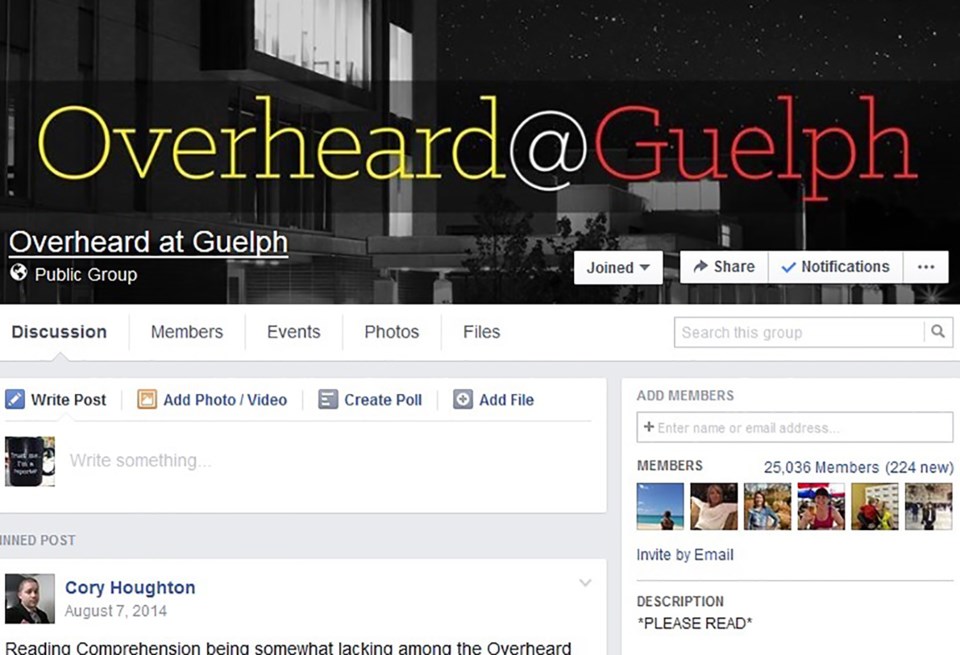From squirrel jokes and memes to intense debate and spirit, thousands are getting a chance to have their say and read the thoughts of others on the Overheard at Guelph Facebook page.
Started in 2009 by University of Guelph alumnus Patrick Gormley, the page currently has over 24,000 subscibers and unlike many forums and threads across the Internet, an Overheard user’s identity is not anonymous.
The page is moderated, the administrators have a particular approach as to what stays and what goes.
“In general we try to limit anything that isn't either a direct experience in Guelph, or at least tangentially relate,” said Cory Houghton, one of six Overheard administrators. “We try to be as consistent as possible.”
“It allows us all to come together at any time to discuss prominent issues, share the woes of exam season, or just laugh at squirrel memes,” said Tessla Bomberry, a U of G art history major. “Guelph has a great community to begin with, but Overheard just makes you feel that much more connected to everyone."
Student Megan Scarth said she likes the relevance of the content.
“I use Overheard as a way of keeping up with what's happening on campus, whether it's important university-related news, or simply something funny that a student has experienced” said Scarth.
Not everyone is a fan.
“It’s an unnecessary addition to Facebook, Twitter and Yik Yak, and no one cares about it,” said Andrew Muszynski, a food and Agricultural business student.
Overheard at Guelph could be helping build a sense of community, says U of G professor Andrea Breen.
Breen's field of expertise is psychology and education and she studies the use of technology to promote healthy children and families.
“I think attaching your name and face adds to making the community feel more real,” said Breen. "I think If you look on there you can see the names of real people and they’re a real part of your community.”
Overheard may also have such a large a following is because of its potential to help develop personal identity, Breen said.
“In past research that we’ve done with university student’s engagement with Facebook, people also use it to figure out who they are,” said Breen. “Even those controversial issues, for some people seeing opposing views to their own … helps them clarify who they are and their own values that are important to them.”
From a study-based perspective Breen feels that examining Overheard at Guelph could provide insight on how to improve community and student life.
“I think one thing is that we can see what people are actually thinking,” said Breen. "It seems like it’s a great opportunity to learn about what students are grappling with, where they are in terms of their thinking and their development on issues.”
Breen suggests that Overheard’s continued success could be a result of the group’s method of administration.
“There’s obviously something about the moderation recipe for this,” said Breen. “It’s safe enough, maybe, because they know unless there is harassment [people] are free to say what they want.”
The moderators at Overheard may delete targeted and harmful comments if requested, but the fallout of posting damaging remarks can go beyond having a post removed.
“People have lost their jobs over things they’ve posted on Facebook, and are held responsible in that regard,” said sociology professor Michelle Dumas.
The University of Guelph does have policies in place to reprimand and educate students that harass others online. Users have the option to report harmful behaviour occurring on social media to the university administration, but administrators do not actively search for comments online.
“We have the authority to intervene through the non-academic misconduct policy ... if the behaviour off campus could affect the ability of a student on campus,” said Brenda Whiteside, the University of Guelph associate vice-president of Student Affairs. “We could also intervene under our acceptable use policy if the students are using any of our own servers.”
Students in the past have been held accountable for harmful behaviour on social media, including activity on sites similar to sites Overheard like Yik Yak.
The scope of consequences for online harassment can range from a warning, to an official judicial procedure often involving campus police. In the case of hate crimes, campus police is mandated to report to Guelph police downtown.
